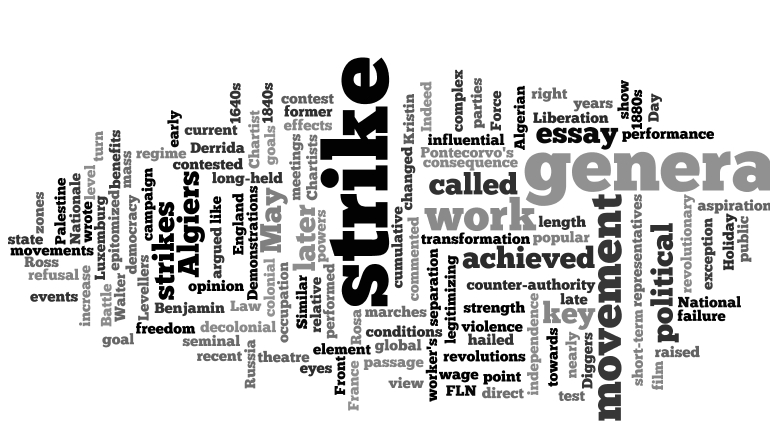Demonstrating the demonstration
 Demonstrations are political theatre, a test of the relative strength of a popular movement, political parties and the current regime. For the Chartists in the 1840s, the point of their mass meetings and marches was to show that they were England, not its representatives. Such performance raised the level of the long-held aspirations towards direct democracy, epitomized by the 1640s revolutionary movements like the Levellers and the Diggers, to that of the general strike.
Demonstrations are political theatre, a test of the relative strength of a popular movement, political parties and the current regime. For the Chartists in the 1840s, the point of their mass meetings and marches was to show that they were England, not its representatives. Such performance raised the level of the long-held aspirations towards direct democracy, epitomized by the 1640s revolutionary movements like the Levellers and the Diggers, to that of the general strike.The general strike is a refusal to work until the conditions under which all work is performed are changed. Its goals are not a wage increase or other such benefits but a transformation of what it is to work. Such were the Chartist National Holiday campaign, the May Day strikes of the late 1880s, and, in the influential view of Rosa Luxemburg, the 1905 revolutions in Russia.
When Walter Benjamin wrote a complex early essay on violence, he hailed the right to strike as a key element of the worker's counter-authority to the state of exception. In turn, Derrida later commented at length on this passage in his seminal essay Force of
In 1957, the Front Liberation Nationale (FLN) called a general strike in Algiers, later the key contest in Pontecorvo's film The Battle of Algiers. While the strike was a "failure" in the short-term, it achieved its goal of legitimizing the independence movement in the eyes of global public opinion.
Similar general strikes have been called in Palestine and other contested decolonial zones of occupation and separation in recent years.
In the former colonial powers, the general strike was most nearly achieved in the events of May 1968 in France. Indeed, Kristin Ross has argued that '68 was the consequence of the cumulative effects of the Algerian freedom movement.
For an archive of the demonstration/general strike
A demonstration is a proof by means of syllogism and definition.
A demonstration is a performance, an event, a rupture.
A demonstration by one or more persons creates a right to look by claiming the right to be seen.
Mash-up materials from 1968:
Danny Cohn-Bendit addresses the crowd on the street using a loud-hailer: he is not smothered by armored police as would certainly happen today, and somehow people seem able to hear his message.
Factory workers going on strike made a simple placard expressing solidarity with immigrants, an internationalism that has been thoroughly defeated in Western politics today.
This news report on the "unlimited strike" in Paris shows that high culture workers at the Paris Opera struck alongside garbage workers, a cross-class alliance.
In a period in which students are offered a choice between dramatically rising tuition or closure of universities, it's important to remember why today's administration buildings all look like fortresses: they're afraid of you.
For an extended consideration of the demonstrations of 2011, please see my blog "For the Right to Look."
Discussion of "Demonstrating the demonstration"
Add your voice to this discussion.
Checking your signed in status ...